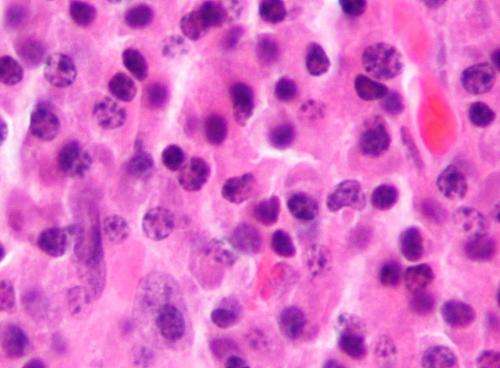
Myeloma UK funded research from The Institute of Cancer Research, London, has identified the main biological processes which cause the genetic mutations associated with the development of myeloma.
The research, published in Blood Cancer Journal, increases our knowledge of how myeloma develops and evolves and also suggests that analysis of mutational signatures could play a role in helping identify high risk myeloma patients and predicting patient outcomes. This will aid the development of more personalized treatments for myeloma patients and help to drive improved diagnosis and assessment of prognosis.
The team at The Institute of Cancer Research (ICR) analyzed whole-genome sequencing (WGS) and whole-exome sequencing (WES) data from more than 800 myeloma patients, collected as part of the CoMMpass trial, to identify and map out which mutational signatures, involved in the development of cancer, were also found in myeloma cells.
By studying the mutational signatures present in myeloma cells, the researchers identified the biological processes driving the mutational changes contributing to the development and evolution of myeloma.
The results showed that four biological processes cause 80% of the mutations found in myeloma.
These processes were:
- Aging
- Errors in DNA repair
- Dysfunction of the RNA/DNA editing activation-induced deaminases (AID)
- Dysfunction of apolipoprotein B editing complexes (APOBEC)
The data also provides evidence of mutational signature specificity between patient sub-groups which indicates that mutational signatures could help improve patient prognosis.
This increased understanding will support the delivery of tailored treatments for myeloma patients. It highlights the complexity of the biological processes involved in the development of myeloma and provides evidence to support the integration of mutational signatures data in the grouping of patient to tailor therapy.
Professor Richard Houlston, Head of the Division of Genetics and Epidemiology at The Institute of Cancer Research, London, said:
“Understanding of the genetics of myeloma plays a key role in identifying why myeloma is such a complex and individual cancer. This research helps improve our knowledge of the processes causing the disease and refine patient outcome.
“With continued funding support from Myeloma UK we aim to learn more about how myeloma evolves. We are performing state of the art molecular analyses to uncover how genetic mutations affect gene function. This information should unlock the key processes defining disease relapse paving the way for novel therapeutic interventions.”
Dr. Karthik Ramasamy, Consultant Haematologist at Oxford University Hospitals and Director of the Board at Myeloma UK said:
“We are pleased to see the results from research largely funded by our Translational Research Programme, helping to understand how and why myeloma develops. Increasing our knowledge of the complex pathways driving the development and progression of myeloma is going to be key to identifying new myeloma therapies, and to enable the tailoring of patient treatments.”
Myeloma, also known as multiple myeloma, is a blood cancer arising from plasma cells, a type of white blood cell that is made in the bone marrow. At any one time there are around 17,600 people living with myeloma in the UK. It accounts for 15 percent of blood cancers, and two percent of all cancers.
Myeloma and genetics
Myeloma is a blood cancer characterised by abnormal plasma cells in the bone marrow. It is caused by mutations in the DNA of plasma cells. Previous research investigating genetic differences between ‘healthy’ plasma cells and myeloma cells resulted in the identification of several cytogenetic abnormalities associated with myeloma. These cytogenetic abnormalities differ between patients and the type of abnormality present affects how a patient’s myeloma presents and responds to treatment. Therefore, a myeloma patient’s genetics can be used to group patients and define patient prognosis and risk status.
Although the common cytogenetic abnormalities found in myeloma cells have been identified, the biological processes causing these mutations are not fully understood.
Mutational signatures
Mutations to the DNA in our cells occur throughout our lifetime. There are many reasons these mutations occur and most mutations are harmless. However, some of these mutations will be involved in the development of cancer.
Source: Read Full Article






